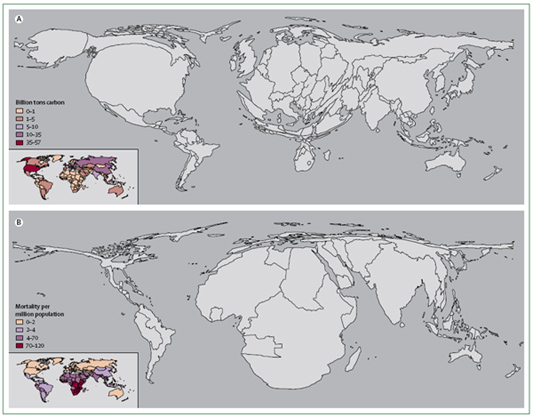In these days the world´s global warming is one of the biggest concerns of humanity. In the past there were controversy about the causes and if it was an irreversible and cyclic process where the human activity didn´t have something to say.
In the year 2007 a scientific report issued by the United Nation concluded that the planet was getting warmer and with a 90 percent of certainty that was caused by the human´s activity (Rosenberg, 2012). Now the controversy is not focused in the causes or occurrence, is focused in the consequences.
Some authors like Thomas Gale Moore (n.d.) have argued that maybe global warming is not as catastrophic as almost all scientists are predicting and could have some good results. He exposed that the effect of global warming will warm winters more than summers, increase temperature in higher latitudes more than in the Ecuador and would produce more precipitations.
For the US economics, he says that the climate will affect agriculture, forestry and fishing and that only represents the 2 percent of the GDP. Manufacturing and industries are almost immune to climate changes because they can be built almost in every part of the world and an increase of 2.5 Celsius grades in the temperature will “only” cost 1 percent of the US GDP (Moore, n.d.).
This is one point of view, but its relative clear that the greenhouse gas emissions will cause more than the rise of some grades in the temperature of the world and will have lots of collateral effects. According to a report released by the Obama Administration in 2009 (Rampell,2009), the potential effects of a global warming will cause climate changes like heavy downpours, storms surges, sea-level rises and more hurricanes that will affect not only agriculture or food production, will affect the transportation system, will flood coastal areas like New York, Florida or New Orleans or will stress the medical system with heat-related illnesses and deaths.
By the other hand, the insurance industry will be challenged because of the natural disasters´ increase; recreating and tourist will suffer major geography changes, the demand for energy will rise for cool homes and offices and decrease for heating. The climate change will generate other disruptions like water shortages and water storage, like the natural ice layers of mountains.
This future looks shadowy, but some American cities are making interesting changes toward combating the source of the problem: the greenhouse gas emissions. Examples are Seattle and Portland Oregon that are promoting the reduction the dependence on fossil fuels, promoting wind and solar energy, encouraging the construction of green buildings, converting the city cars to biodiesel, between others (Clearing, 2006).
But, what happens at a global level? According to an 2009 article from the Lancet Commissions, the countries that are considered the mayor responsible for climate changes are the US, the European countries and China (depleted cumulative CO2 emission by country for 1950—2000). On the opposite sidewalk are the countries that will be harmed by climate changes: the African countries, India and some underdeveloped countries form Asia because of their climate-sensitive consequences like malaria, malnutrition, diarrhea and inland flood-related fatalities (Costello, et al., 2009).
This problem can bring another collateral problem: the immigration of people from poorest countries to richest countries like the US that have the resources to counteract some of the global warming effects.
Sounds unfair? What should the develop countries do?
Resources
Clearing the air (2006). McGraw-Hill/Irwin Management
Costello, A., et al. (2009). Managing the health effect of climate change. The Lancet Commissions (2009). Retrieved on April 4, 2012 from http://environmentportal.in/files/Managing%20the%20health%20effects%20of%20climate%20change.pdf
Moore, T.G. (n.d.). Global warming: A balance sheet. The Concise Encyclopedia of Economics. Retrieved on April 4, 2012 from http://www.econlib.org/library/Enc/GlobalWarmingABalanceSheet.html
Rosenberg, M. (2012, January 26). Advantages and disadvantages of global warming. About.com Retrieved on April 4, 2012 from http://geography.about.com/od/globalproblemsandissues/a/advantages.htm
Rampell, C. (2009, June 16). The economic impact of climate change. New York Times. Retrieved on April 4, 2012 from http://economix.blogs.nytimes.com/2009/06/16/the-economic-impact-of-climate-change/






Leave A Comment